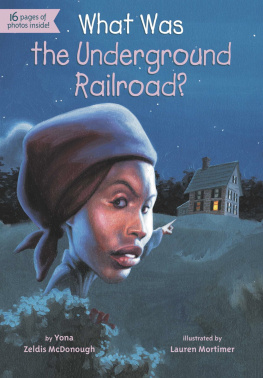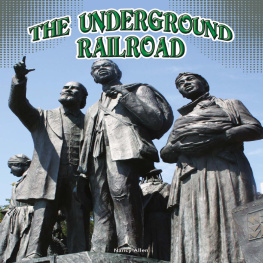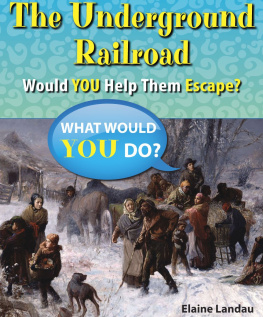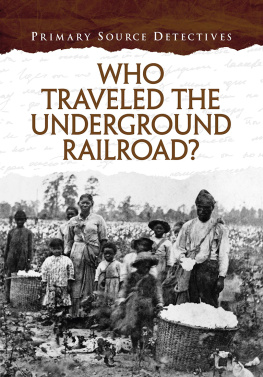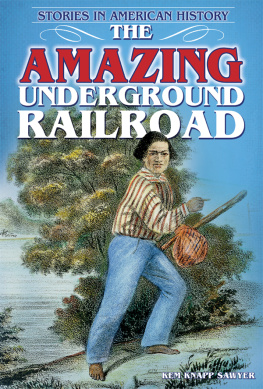Colson Whitehead - The Underground Railroad
Here you can read online Colson Whitehead - The Underground Railroad full text of the book (entire story) in english for free. Download pdf and epub, get meaning, cover and reviews about this ebook. year: 0, genre: History. Description of the work, (preface) as well as reviews are available. Best literature library LitArk.com created for fans of good reading and offers a wide selection of genres:
Romance novel
Science fiction
Adventure
Detective
Science
History
Home and family
Prose
Art
Politics
Computer
Non-fiction
Religion
Business
Children
Humor
Choose a favorite category and find really read worthwhile books. Enjoy immersion in the world of imagination, feel the emotions of the characters or learn something new for yourself, make an fascinating discovery.

- Book:The Underground Railroad
- Author:
- Genre:
- Year:0
- Rating:3 / 5
- Favourites:Add to favourites
- Your mark:
- 60
- 1
- 2
- 3
- 4
- 5
The Underground Railroad: summary, description and annotation
We offer to read an annotation, description, summary or preface (depends on what the author of the book "The Underground Railroad" wrote himself). If you haven't found the necessary information about the book — write in the comments, we will try to find it.
The Underground Railroad — read online for free the complete book (whole text) full work
Below is the text of the book, divided by pages. System saving the place of the last page read, allows you to conveniently read the book "The Underground Railroad" online for free, without having to search again every time where you left off. Put a bookmark, and you can go to the page where you finished reading at any time.
Font size:
Interval:
Bookmark:
The Noble Hustle
Zone One
Sag Harbor
Apex Hides the Hurt
The Colossus of New York
John Henry Days
The Intuitionist
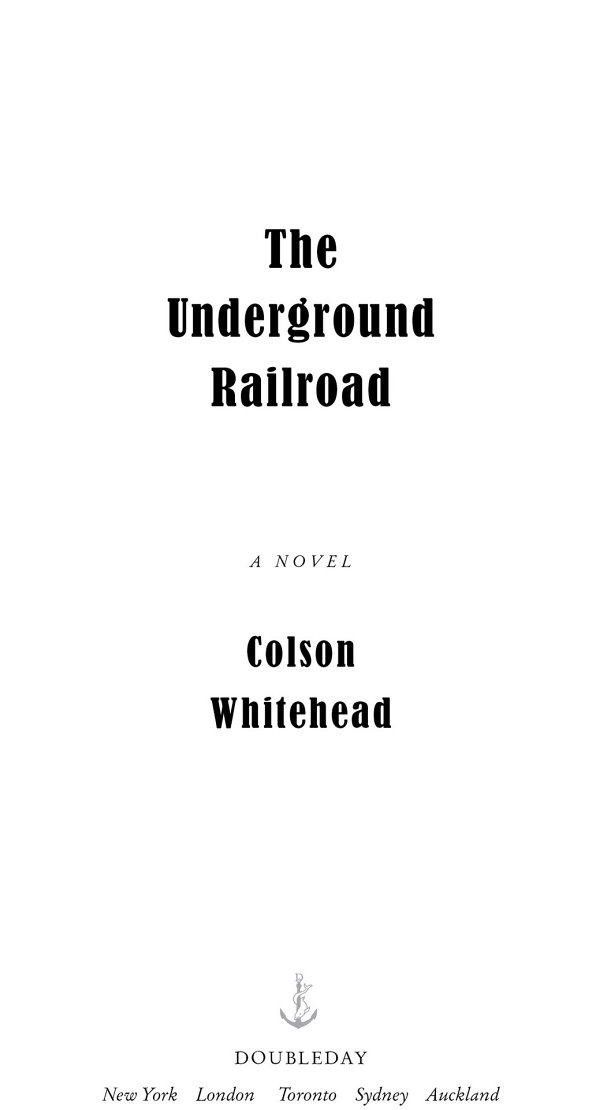

This is a work of fiction. Names, characters, places, and incidents either are the product of the authors imagination or are used fictitiously. Any resemblance to actual persons, living or dead, events, or locales is entirely coincidental.
Copyright 2016 by Colson Whitehead
All rights reserved. Published in the United States by Doubleday, a division of Penguin Random House LLC, New York, and distributed in Canada by Random House of Canada, a division of Penguin Random House Canada Limited, Toronto.
www.doubleday.com
DOUBLEDAY and the portrayal of an anchor with a dolphin are registered trademarks of Penguin Random House LLC.
Cover design by Oliver Munday
Library of Congress Cataloging-in-Publication Data
Names: Whitehead, Colson, 1969 author.
Title: The underground railroad : a novel / Colson Whitehead.
Description: New York : Doubleday, 2016.
Identifiers: LCCN 2016000643 (print) | LCCN 2016004953 (ebook) ISBN 9780385542364 (hardcover) | ISBN 9780385537049 (ebook)
Subjects: LCSH: Underground RailroadFiction. | Fugitive slavesUnited StatesFiction. | United StatesHistory19th centuryFiction.
BISAC: FICTION / Literary. | FICTION / Historical.
FICTION / African American / General. | GSAFD: Historical fiction.
Classification: LCC PS3573.H4768 U53 2016 (print)
LCC PS3573.H4768 (ebook)
DDC 813/.54dc23
LC record available at http://lccn.loc.gov/2016000643
ebook ISBN9780385537049
v4.1
ep
For Julie


THE first time Caesar approached Cora about running north, she said no.
This was her grandmother talking. Coras grandmother had never seen the ocean before that bright afternoon in the port of Ouidah and the water dazzled after her time in the forts dungeon. The dungeon stored them until the ships arrived. Dahomeyan raiders kidnapped the men first, then returned to her village the next moon for the women and children, marching them in chains to the sea two by two. As she stared into the black doorway, Ajarry thought shed be reunited with her father, down there in the dark. The survivors from her village told her that when her father couldnt keep the pace of the long march, the slavers stove in his head and left his body by the trail. Her mother had died years before.
Coras grandmother was sold a few times on the trek to the fort, passed between slavers for cowrie shells and glass beads. It was hard to say how much they paid for her in Ouidah as she was part of a bulk purchase, eighty-eight human souls for sixty crates of rum and gunpowder, the price arrived upon after the standard haggling in Coast English. Able-bodied men and childbearing women fetched more than juveniles, making an individual accounting difficult.
The Nanny was out of Liverpool and had made two previous stops along the Gold Coast. The captain staggered his purchases, rather than find himself with cargo of singular culture and disposition. Who knew what brand of mutiny his captives might cook up if they shared a common tongue. This was the ships final port of call before they crossed the Atlantic. Two yellow-haired sailors rowed Ajarry out to the ship, humming. White skin like bone.
The noxious air of the hold, the gloom of confinement, and the screams of those shackled to her contrived to drive Ajarry to madness. Because of her tender age, her captors did not immediately force their urges upon her, but eventually some of the more seasoned mates dragged her from the hold six weeks into the passage. She twice tried to kill herself on the voyage to America, once by denying herself food and then again by drowning. The sailors stymied her both times, versed in the schemes and inclinations of chattel. Ajarry didnt even make it to the gunwale when she tried to jump overboard. Her simpering posture and piteous aspect, recognizable from thousands of slaves before her, betrayed her intentions. Chained head to toe, head to toe, in exponential misery.
Although they had tried not to get separated at the auction in Ouidah, the rest of her family was purchased by Portuguese traders from the frigate Vivilia, next seen four months later drifting ten miles off Bermuda. Plague had claimed all on board. Authorities lit the ship on fire and watched her crackle and sink. Coras grandmother knew nothing about the ships fate. For the rest of her life she imagined her cousins worked for kind and generous masters up north, engaged in more forgiving trades than her own, weaving or spinning, nothing in the fields. In her stories, Isay and Sidoo and the rest somehow bought their way out of bondage and lived as free men and women in the City of Pennsylvania, a place she had overheard two white men discuss once. These fantasies gave Ajarry comfort when her burdens were such to splinter her into a thousand pieces.
The next time Coras grandmother was sold was after a month in the pest house on Sullivans Island, once the physicians certified her and the rest of the Nannys cargo clear of illness. Another busy day on the Exchange. A big auction always drew a colorful crowd. Traders and procurers from up and down the coast converged on Charleston, checking the merchandises eyes and joints and spines, wary of venereal distemper and other afflictions. Onlookers chewed fresh oysters and hot corn as the auctioneers shouted into the air. The slaves stood naked on the platform. There was a bidding war over a group of Ashanti studs, those Africans of renowned industry and musculature, and the foreman of a limestone quarry bought a bunch of pickaninnies in an astounding bargain. Coras grandmother saw a little boy among the gawkers eating rock candy and wondered what he was putting in his mouth.
Just before sunset an agent bought her for two hundred and twenty-six dollars. She would have fetched more but for that seasons glut of young girls. His suit was made of the whitest cloth she had ever seen. Rings set with colored stone flashed on his fingers. When he pinched her breasts to see if she was in flower, the metal was cool on her skin. She was branded, not for the first or last time, and fettered to the rest of the days acquisitions. The coffle began their long march south that night, staggering behind the traders buggy. The Nanny by that time was en route back to Liverpool, full of sugar and tobacco. There were fewer screams belowdecks.
You would have thought Coras grandmother cursed, so many times was she sold and swapped and resold over the next few years. Her owners came to ruin with startling frequency. Her first master got swindled by a man who sold a device that cleaned cotton twice as fast as Whitneys gin. The diagrams were convincing, but in the end Ajarry was another asset liquidated by order of the magistrate. She went for two hundred and eighteen dollars in a hasty exchange, a drop in price occasioned by the realities of the local market. Another owner expired from dropsy, whereupon his widow held an estate sale to fund a return to her native Europe, where it was clean. Ajarry spent three months as the property of a Welshman who eventually lost her, three other slaves, and two hogs in a game of whist. And so on.
Font size:
Interval:
Bookmark:
Similar books «The Underground Railroad»
Look at similar books to The Underground Railroad. We have selected literature similar in name and meaning in the hope of providing readers with more options to find new, interesting, not yet read works.
Discussion, reviews of the book The Underground Railroad and just readers' own opinions. Leave your comments, write what you think about the work, its meaning or the main characters. Specify what exactly you liked and what you didn't like, and why you think so.





